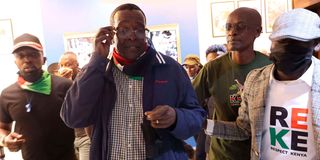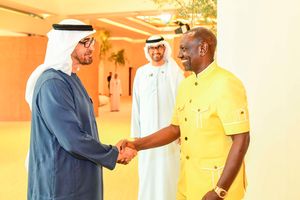
Former Chief Justice David Maraga (centre) when he sought refuge at Nation Center in Nairobi after being teargassed by the police during the June 25, 2025 protests.
I was only eight, but I remember the feeling like it was yesterday. The air at Uhuru Park and in the streets of Nairobi was electric. Crowds roared with one voice, “Yote yawezekana bila Moi,” as if shedding decades of fear in a single breath. That December, in 2002, Kenya turned a new page. Mwai Kibaki, calm and on a wheelchair after a near-fatal crash, became the symbol of a new beginning.
A similar yearning, for a reset, hangs in the air today, and the name being whispered is David Maraga. Like Kibaki, he doesn’t dazzle crowds with fiery speeches, and perhaps that is why Kenyans are starting to trust him. To understand this moment, especially for the Gen Zs, let’s revisit the quiet strength that defined Kibaki, and now defines Maraga.
Mwai Kibaki’s political career spanned nearly four decades before 2002. Born in 1931 in Nyeri, he was a brilliant economist, educated at Makerere and later the London School of Economics. While still in his 20s, Kibaki helped prepare the election manifesto for Uganda’s leader Milton Obote. When Jaramogi Oginga Odinga visited Uganda and was struck by the quality of the document, he asked who had authored it. “A team led by a Kenyan,” came the answer. That Kenyan was Mwai Kibaki.
Impressed, Jaramogi brought him into Kenya’s liberation fold and asked him to help draft KANU’s manifesto at independence. That began Kibaki’s quiet influence on the post-colonial state. As a technocrat, he helped steer Kenya’s early economy, eventually rising to serve as Finance Minister and later Vice President, under Moi. Kibaki avoided confrontations, earning the nickname “General Kiguoya.”
By 2002, Kenya’s opposition had finally come together under the National Rainbow Coalition (NARC). Though Kibaki was not the most popular figure, he emerged as the compromise candidate, steady, experienced, and acceptable to all sides.
Nullified presidential election
Kibaki went on to win by a landslide, leading to the country’s first peaceful transfer of power. It was a redemptive moment, a break from the past that many had long hoped for.
Fast-forward to the 2010s. In a political landscape thick with impunity, a new face emerged in Kenya’s Judiciary: David Maraga. Born in 1951 in Nyamira County, he was a career lawyer and later judge, disciplined and reserved. He rose quietly, serving first as a High Court judge and then as President of the Court of Appeal. But it was as Chief Justice that Maraga made history.
In September 2017, he led the Supreme Court in nullifying the presidential election, citing irregularities and illegalities. The incumbent, President Uhuru Kenyatta of the Jubilee Party, had been declared the winner with 54 per cent of the vote. However, Opposition leader Raila Odinga, of ODM, contested the results in the Supreme Court.
It was a ruling that sent shock waves across Africa and the world. No court on the continent had ever done such a thing. His decision drew both admiration and fury.
The political elite seethed and called for his removal. But Maraga stood his ground. Calm and unshaken, he reminded Kenya that the Constitution is our true north not any individual.
After retiring in 2021, Maraga quietly returned to private life with no political ambitions. But the events unfolding in the country today have drawn him back into the national conversation, not out of desire for power but out of a sense of duty. With young people now demanding more than token reforms, the idea of Maraga as a figure to lead the reset is gaining traction.
Kenya's economic recoveries
Still, like Kibaki, some call Maraga too soft for a national reset. They argue that what Kenya needs is not a priestly judge but a firm hand, a bulldozer of sorts. In that same breath, some have floated the most powerful Cabinet Secretary under Uhuru Kenyatta, as a tougher alternative.
It may be true. Matiang’i earned a reputation for decisiveness and control. He was forceful and unafraid of confrontation. But his legacy is controversial. He disobeyed court orders, is also accused of overseeing state-sanctioned killings, and embodied deep-state impunity.
So the real question may not be strength versus softness. After all, what kind of strength are we talking about ? Strength of ego or strength of character? Maraga’s kind of firmness is quieter but rooted in principle. It doesn’t break the law to protect the law. And maybe, just maybe, that is the kind of strength Kenya needs now.
In his victory speech in 2002, Kibaki promised that the moment Parliament reconvened, his government would establish the Anti-Corruption and Economic Crimes Act and give the authority power to prosecute “whoever should be prosecuted.”
Recently in a forum where former Chief Justice Maraga spoke, I was struck by how closely his words echoed Kibaki's in 2002. I don’t know if he remembered that speech, but he said almost the same thing. If given the chance, he would ensure the anti-corruption authority is truly independent and fully empowered. No one, not even the president, would be above the law.
Kibaki didn’t campaign with sensational slogans. Yet he presided over one of the most stable economic recoveries in Kenya’s history. Maraga, too, may never give rousing speeches but he could be the man that will reset Kenya.
History, after all, doesn’t repeat itself. But it often rhymes.
The writer is a whistleblower, strategy consultant and startup mentor. www.nelsonamenya.com







